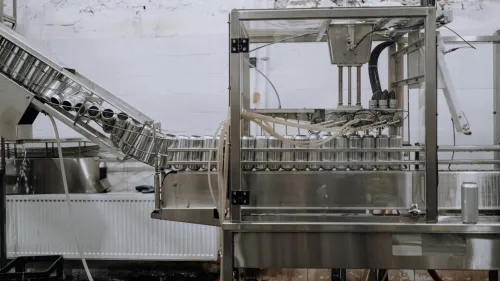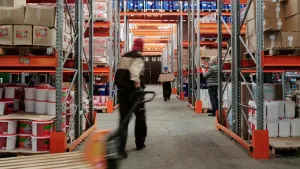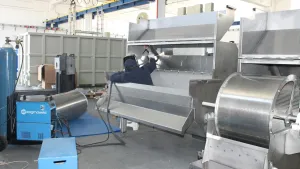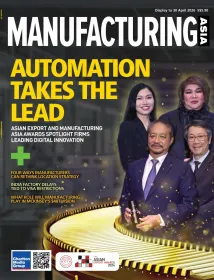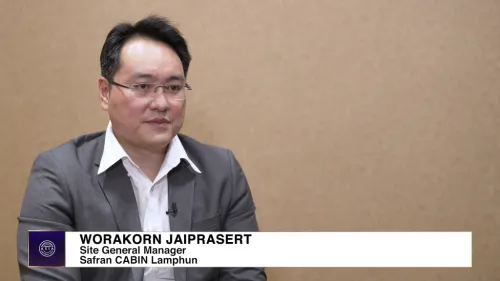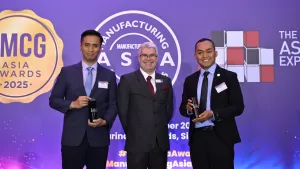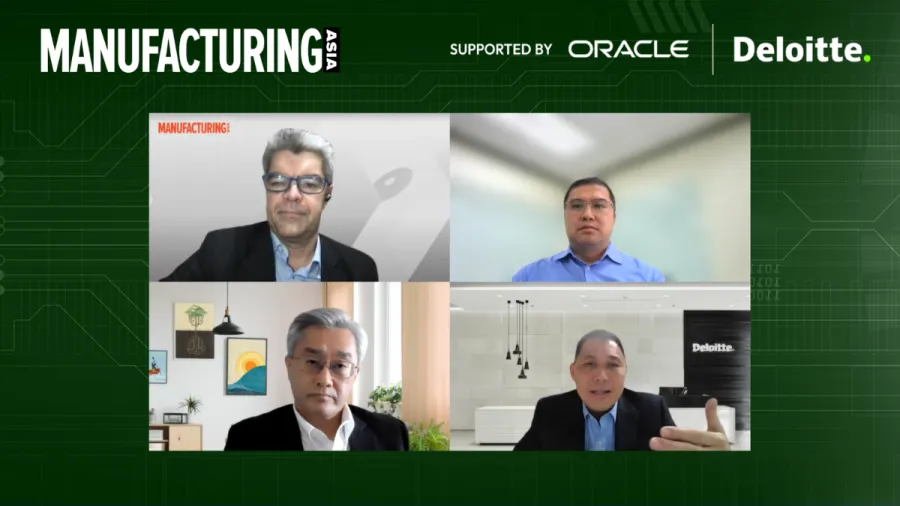
Increasing agility, boosting resilience, putting ESG in the centre and speeding time to market: How manufacturers can turn challenges into opportunities in a VUCA world
Oracle and Manufacturing Asia lead discussions on ways to address current industry challenges and talk about what "best" looks like in the manufacturing sector today.
The manufacturing industry is facing a new set of challenges in today’s volatile, uncertain, complex, and ambiguous economic environment. The requirements for maintaining business performance, reducing costs, and delivering high-quality products are becoming more complex every day. The need to increase agility, boost resilience, and speed time to market for new products and services has never been greater. Add to that, there is also a pressing need for them to address environmental, social, and governance (ESG) priorities as consumers and regulators alike are calling manufacturers to have greater corporate accountability in this area. To overcome these challenges, manufacturers need to adapt and embrace the latest technology solutions.
Smart manufacturing, with the help of Intelligent Automation, IoT, AI, ML, augmented reality, and virtual reality, amongst others, is a necessary step to improve overall equipment effectiveness, reduce costs, and increase product quality. Deloitte Consulting has published data showing that their smart manufacturing projects have led to a 20% improvement in asset efficiency and a 30% improvement in product quality.
Manufacturing companies must continuously improve the availability of data, retrain their labour force, and make sure that their processes are flexible and efficient. They must also be able to detect market demand, make decisions with qualified data, and have visibility across multiple tiers of their supply chain. Key performance indicators such as finished product first-pass quality yield, controllable costs, unplanned machine downtime, warranty costs, scrap and waste reduction, and rework costs must be measured to maintain top performance.
The next five years will require intelligence, cohesive planning, and the right solution to advance the manufacturing industry and survive in this rapidly changing environment. By embracing smart manufacturing, manufacturing companies can ensure their success and competitiveness in the marketplace.
Terence Foo, a leading expert in the manufacturing industry, recently participated in a panel discussion focused on the macro trends affecting businesses across the world today. The discussion centred around the term VUCA (volatile, uncertain, complex and ambiguous), which is used to describe the state of the current economy.
According to Terence, the VUCA trends are here to stay and offer both challenges and opportunities for the manufacturing industry. On a macro level, Southeast Asia is well positioned to take advantage of the disruption, with a relatively digitised economy, a well-trained workforce, and available capital to invest.
However, on an individual level, Terence emphasised the need to upgrade skills and transition to the next stage of supply chain management. This includes a move towards a more circular economy and a focus on sustainability and resiliency, which will be increasingly demanded by consumers and boards.
Terence also highlighted the importance of investing in smart manufacturing capabilities across Southeast Asia, as a way to stay ahead of the curve and be prepared for the disruptions that are sure to come.
In today's rapidly evolving business landscape, manufacturers are facing numerous challenges in the supply chain planning process. From securing necessary sources to settling the production process, there is a significant lag time in the procurement of materials needed to manufacture finished goods.
To address these challenges, a panel discussion was held to delve into the issues facing the smart manufacturing space and explore solutions to improve the entire supply chain process. The discussion highlighted the need for a synchronised Manufacturing Cloud, with AML populated data, and a huge cloud computing resource to generate meaningful analytics based on big data.
The panel was led by a seasoned supply chain expert, who shared his insights on why the efficiency and resilience of the supply chain matter to CFOs and how it can lead to lower supply chain costs, including manufacturing costs. The discussion also delved into the role of AI and ML in predicting the future and changing business strategies to meet future challenges.
Using data for decision making
The panel addressed a complex question from Nabil Nizam regarding the standardisation of a line system across diverse industries. Terence noted that there is no silver bullet solution to the problem, and that it is important for each industry to understand their own level of differentiation and where their competitive edge lies in order to gather the right data.
Terence further highlighted that different industries may have different critical data needs, with some industries placing more importance on product lifecycle development, while others may focus more on reducing unit costs through accurate forecasting.
As Oracle’s Michael Lim shared, the manufacturing and supply chain process involves multiple tiers, and it is essential for companies to understand which tier holds the most critical data for better decision-making.
The discussion emphasised the importance of knowing one's business and competitive advantage, as well as the role that technology and mobile apps can play in capturing and utilising data effectively.
The panel concluded by reiterating the importance of understanding the unique data needs of each industry and how they can use that information to make better decisions and stay ahead of the competition.
They emphasised the importance of understanding demand and supply, as well as keeping abreast of government regulations and emerging trends in the industry. By having a clear understanding of demand, organisations can better plan for the future, including potential disruptions.
The panel also stressed the importance of synchronising the entire organisation in the planning process, as this can lead to a more efficient and effective supply chain. This includes having a clear SOP (Standard Operating Procedure) or IBP (Integrated Business Planning) that aligns with the organisation's goals and objectives.
The experts encouraged organisations to start by taking a closer look at their business model and understanding which aspects need to be improved to create a resilient and sustainable supply chain. They also emphasised the importance of having competent and competitive knowledge of supply, as well as the capability to hedge and manage risks.
Hedging and adapting
In conclusion, the panel discussed the importance of having a solid supply chain planning process and the role it plays in creating a resilient and sustainable supply chain. Organisations should start by understanding demand and supply, aligning the entire organisation in the planning process, and continuously monitoring trends and regulations.
In the face of numerous challenges including the war in Ukraine, the COVID-19 pandemic, and climate change, our industry has remained resilient in delivering sales commitments and maintaining a strong bottom line. This is achieved through our effective hedging strategy and continuous adaptation to the changing market conditions.
According to Rommel Samson, CFO UNAHCO & Division Vice President, Unilab, Inc., to secure the supply of raw materials, UNAHCO / Unilab implemented forward contracts and continuously reformulated its feed ingredients based on local availability and in countries such as Vietnam, Myanmar, and Indonesia. Their recently implemented ERP system has also provided comprehensive visibility in the manufacturing processes, maintenance, and inventory management.
Samson noted that one unique aspect of the industry is the constant need for dynamic costing, as products require frequent formulation changes. To address this, UNAHCO implemented barcoding technology and integrated it with its ERP system, enabling it to accurately track and optimise production efficiency.
These efforts have allowed UNAHCO to overcome the obstacles posed by external factors and continue to provide quality products to its customers.
"In your own terms, what does best look like in the manufacturing industry?" The panel, composed of industry leaders and experts, discussed the current state of the manufacturing industry and how companies can strive for excellence.
Oracle, with over 11,000 Fusion Cloud Applications customers around the world, conducted surveys to understand the outcomes of companies after implementing its real-time database analytics and machine learning-based solution, Fusion. The surveys showed the gap between the current process and the desired outcome, and Oracle used this information to provide customers with a cost of ownership analysis and a prediction of the return on investment for the next three to five years.
The panellists discussed the importance of accurate demand management forecasts, driven by machine learning, in meeting customer demand. They also emphasised the various priorities and challenges faced by different manufacturing companies, including contract manufacturers, project-based manufacturers, heavy industry manufacturing, food and beverage companies, and more.
Oracle has conducted surveys and process studies to identify modern best practices for specific manufacturing segments and offers these processes to customers free of charge. With a partner like Deloitte, Oracle helps customers prioritise their pain points and challenges, and maps out the necessary steps for digital transformation. The panellists agreed that the segmentation of priorities can vary for each company, but Oracle and Deloitte can provide valuable advice and ecosystem partners to help companies achieve their goals.
